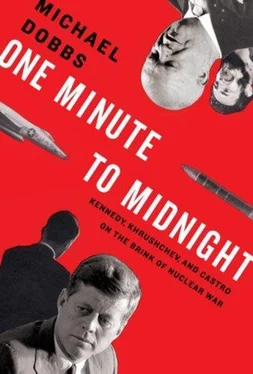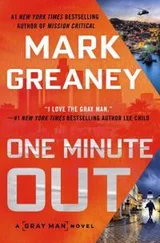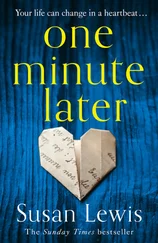Khrushchev had prepared the Presidium for the inevitability of a tactical retreat by depicting the American promise not to invade Cuba as a victory for Soviet diplomacy. His defense was that he was acting in the tradition of the great Lenin, who had surrendered a huge swathe of territory to the Germans under the punitive 1917 Treaty of Brest-Litovsk to “save Soviet power.” The stakes were even higher now. Khrushchev told his colleagues that they had to defuse “the danger of war and nuclear catastrophe, with the possibility of destroying the human race. To save the world, we must retreat.”
An aide jotted down the two main points made by the first secretary:
1. If an attack [on Cuba] is provoked, we have given the order for a retaliatory response;
2. We agree to dismantle the missile sites.
The real question facing Khrushchev was not whether to retreat but the logistics for implementing the pullout decision and the concessions he could extract from Washington in return. That issue was largely resolved for him by a series of alarming reports that arrived while the meeting was in progress.
A telegram from the KGB residency in Havana reported that “our Cuban friends consider that invasion and bombarding of military objects is inevitable.” The cable gave added emphasis to Castro’s earlier warning. This was followed at 10:45 a.m. Moscow time by the formal Soviet report on the downing of the American U-2 the previous day. The message, signed by Malinovsky, made clear that the plane had been brought down by a Soviet, rather than Cuban, antiaircraft unit. But it did not say who ordered the shootdown. The possibility that Soviet commanders on Cuba were following Castro’s orders on such a sensitive matter alarmed Khrushchev.
As the Presidium members were digesting this information, Khrushchev’s foreign policy aide, Oleg Troyanovsky, was summoned to the telephone. The Foreign Ministry had just received a coded cable from Dobrynin on his meeting with Bobby Kennedy. Troyanovsky scribbled down the essential points and returned to the Presidium session.
As the Presidium members listened to Dobrynin’s report, the “highly electric” mood of the meeting became even more charged. RFK’s reference to hotheaded American generals resonated with Khrushchev and other Soviet leaders who had long suspected that the Pentagon was the real center of power in Washington. The ambassador’s report made it clear that the “hour of decision” had finally arrived.
The Presidium members asked Troyanovsky to read the cable again, so they could fully understand its implications. The Turkey offer clearly sweetened the proposed deal even if, as Dobrynin reported, Bobby Kennedy insisted it be kept “extremely confidential.” Any remaining desire to haggle about terms and conditions drained away. After listening to the latest message from Washington, the men around the table “agreed fairly quickly that they had to accept President Kennedy’s conditions,” Troyanovsky would later recall. “In the final analysis, both we and Cuba would get what we wanted, a guarantee that the island would not be attacked.”
At this point, a phone call arrived for the secretary of the Defense Council. Colonel General Semyon Ivanov returned a few minutes later to report that the U.S. president would go on television at 9:00 a.m. Washington time. It looked as if Kennedy was about to make some kind of dramatic announcement, perhaps a U.S. attack on Cuba or the bombardment of the missile bases.
The good news was that Khrushchev had an extra hour to reply to Kennedy’s letter. The time difference between Moscow and Washington had stretched from seven hours to eight hours overnight with the end of American Daylight Saving Time. The deadline for a Soviet reply was 5:00 p.m. Moscow time. To save time, the reply would be transmitted publicly by radio, rather than as a coded diplomatic cable.
There was not a moment to lose. Khrushchev called for a stenographer, and began dictating a personal letter to John F. Kennedy.
Despite all their differences, both personal and ideological, the two men had reached similar conclusions about the nature of nuclear war. Nikita Khrushchev and John Kennedy both understood that such a war would be far more terrible than anything mankind had known before. Having witnessed war themselves, they also understood that a commander in chief could not always control his own armies. They were awed, frightened, and sobered by their power to blow up the world. They believed that the risks of war had become unacceptably high, and it was necessary to act decisively to cut what Khrushchev had called “the knot of war.” In short, they were both human beings—flawed, idealistic, blundering, sometimes brilliant, often mistaken, but ultimately very aware of their own humanity.
Kennedy had already decided, against the advice of many of his closest aides, that he was not going to risk a nuclear war over a few obsolete missiles in Turkey. He had concluded that “we are not going to have a very good war” unless he could provide the American people with a convincing explanation of the “whys and wherefores.”
The master of the Kremlin did not have to pay as much attention to public opinion, at least in the short term, as the occupant of the Oval Office. But he too understood that his people would never forgive him if he led them into a “war of annihilation” without taking “all necessary measures” to prevent it. Castro’s suggestion that he consider a preemptive nuclear strike against the United States filled him with foreboding. Even though Khrushchev was a gambler by nature—his Presidium colleagues would later accuse him of “hare-brained scheming”—he would not tempt fate. He had a crafty peasant’s instinct for when to push and when to pull back. As he told his generals before sending them on their Cuban adventure, “Let none of you think that he can lead God around by the beard.”
When they met in Vienna in June 1961, Khrushchev had privately felt “a bit sorry” for Kennedy even as he bullied him over Berlin. He vividly recalled the expression of deep disappointment on the president’s face when the meeting broke up. But he reminded himself that “politics is a merciless business” and resisted the temptation to help his rival out. He felt free to bluster and threaten as long as there was no grand consequences. The situation now was very different. The world was teetering on the edge of nuclear destruction. The Russian had come to “deeply respect” the American. Kennedy had shown himself to be “sober-minded.” He had not allowed himself “to become frightened,” but neither did he “become reckless.” He had not “overestimated America’s might.” He had “left himself a way out of the crisis.”
Khrushchev’s latest missive to Kennedy contained the usual outpouring of impulsive thoughts and pungent imagery. The diplomats would go over the text later, bringing it “up to standard,” in bureaucratic jargon. Knowing that time was short, the chairman got to the point very quickly. The Soviet Union would withdraw its missiles from Cuba. A jumble of self-justification followed. Cuba had been “under continuous threat by aggressive forces, which did not conceal their intention to invade its territory.” “Piratic ships” roamed freely around. The Soviet weaponry was for defensive purposes only. The Soviet people wanted “nothing but peace.”
Having done his part to avert war, Khrushchev detailed his complaints about American behavior. At the top of the list was the provocative probing of Soviet territory by U.S. reconnaissance planes. He reminded Kennedy that the slightest spark could result in a general conflagration. Soviet air defenses had reported an overflight of the Chukot Peninsula by an American U-2.
The question is, Mr. President: how should we regard this? What is this: a provocation? One of your planes violates our frontier during this anxious time we are both experiencing, when everything has been put into combat readiness. Is it not a fact that an intruding American plane could be easily taken for a nuclear bomber, which might push us to a fateful step? And all the more so since the U.S. government and Pentagon long ago declared that you are maintaining a continuous nuclear bomber patrol.
Читать дальше












